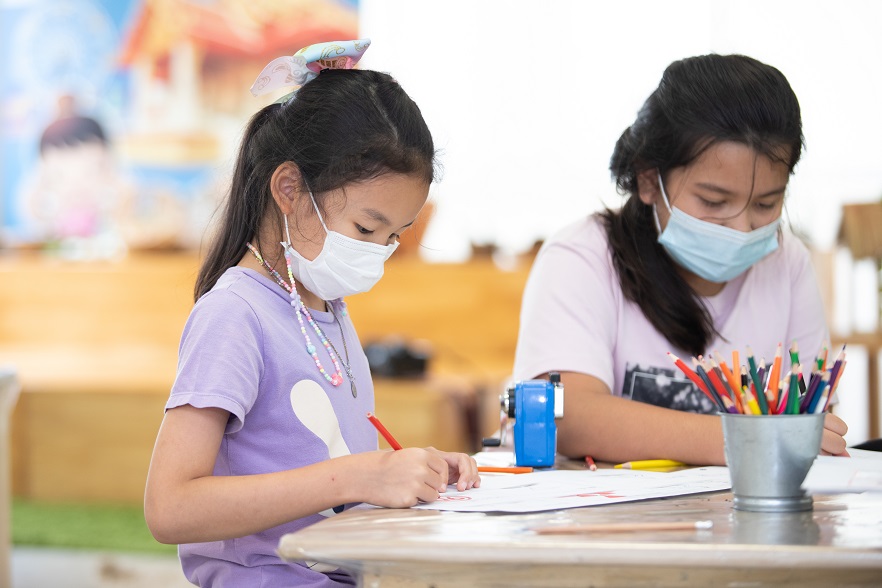In This Section

Ages: 9 – 10 years
Grade 4 is 5 days a week from 8:00am to 3:00pm (snack and lunch included) with the option of After School Clubs. Grade 4 has one teacher and one co-teacher.
Grade 4 Curriculum:
An aim of the PYP is to create a transdisciplinary curriculum that is engaging, relevant, challenging and significant for learners. This curriculum provides opportunities for students to build meaning and refine their understandings through a range of student- centered engagements. The curriculum is broken down into six transdisciplinary themes that the International Baccalaureate considers essential in the context of international education, known as the Program of Inquiry (POI).
Unit of Inquiry
Students at MYIS International School inquire into and learn about local and global issues in the context of units of inquiry, each of which addresses a particular transdisciplinary theme.
Each of these units:
- stands alone as an engaging, challenging, relevant and significant experience
- contributes to a coherent, school-wide program of inquiry that is framed in terms of transdisciplinary themes of global significance
- draws together elements of different subject areas (language, mathematics, personal social physical education, the arts, science and social studies) to support the exploration of a central idea.
Who We Are
An inquiry into the nature of the self; beliefs and values; personal, physical, mental, social and spiritual health; human relationships including families, friends, communities and cultures; rights and responsibilities; what it means to be human.
Central Idea: Belief and value systems offer explanations about the world around us.
Key Concepts: Connection, function, perspective
Related Concepts: Commonalities, behavior/tradition/rituals, tolerance/bias/open-mindedness
Lines of Inquiry:
- Similarities and differences among belief systems
- How beliefs influence the way we behave
- How people deal with differences in beliefs
Where We Are in Place and Time
An inquiry into orientation in place and time; personal histories; homes and journeys; the discoveries, explorations, and migrations of humankind; the relationships between and the interconnectedness of individuals and civilizations, from local and global perspectives.
Central Idea: People migrate as a response to challenges and opportunities
Key Concepts: Causation, perspective, change
Related Concepts: Diversity, prejudice, consequences
Lines of Inquiry:
- Reasons for migrations
- Effects of migration on cultures, communities and individuals
- Migration throughout history
How We Express Ourselves
An inquiry into the ways in which we discover and express ideas, feelings, nature, culture, beliefs and values; the ways in which we reflect on, extend and enjoy our creativity; our appreciation of the aesthetic.
Central Idea: Recognizing gender differences and stereotypes supports understanding and communication.
Key Concepts: Perspective, reflection, responsibility
Related Concepts: Gender roles, identity, leadership, message
Lines of Inquiry:
- Stereotypes in messages
- Differences in the way boys and girls think and communicate
- Understanding each other’s perspectives
How the World Works
An inquiry into the natural world and its laws; the interaction between the natural world (physical and biological) and human societies; how humans use their understanding of scientific and technological advances on society and on the environment.
Central Idea: Understanding weather patterns allows people to plan, prepare, and deal with their impact.
Key Concepts: Form, causation, change
Related Concepts: cycles, forecasting, mitigation
Lines of Inquiry:
- Weather patterns and their causes
- Tracking and forecasting weather
- Impact of weather patterns on people worldwide
How we Organize Ourselves
An inquiry into the interconnectedness of human-made systems and communities; the structure and function of organizations; societal decision-making; economic activities and their impact on humankind and the environment.
Central Idea: Communities have rules and laws, while people have rights and responsibilities
Key Concepts: Function, connection responsibility
Related Concepts: Systems, justice, rights, governance, citizenship
Lines of Inquiry:
- Rights and responsibilities in various form of government
- The relationship between governments and its citizens
- How different governments are structured
Sharing the Planet
An inquiry into rights and responsibilities in the struggle to share finite resources with other people and with other living things; communities and the relationships within and between them; access to equal opportunities; peace and conflict resolution.
Central Idea: People can make choices to support the sustainability of Earth’s resources.
Key Concepts: Connection, causation, responsibility
Related Concepts: Equality, distribution, sustainability, systems
Lines of Inquiry:
- Distribution of resource
- Impact of people’s choices on the environment
- Our responsibility towards local communities